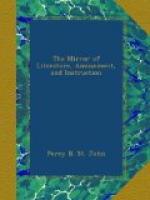* * * * *
MARRIAGE.
The minister of Logierait, in Perthshire, in his statistical account of that parish, supplies us with the following curious information on this and other marriage ceremonies:—“Immediately before the celebration of the marriage ceremony, every knot about the bride and bridegroom (garters, shoe-strings, strings of petticoats, &c.) is carefully loosed. After leaving the church, the whole company walk round it, keeping the church walls always upon the right hand; the bridegroom, however, first retires one way, with some young men, to tie the knots that were loosened about him, while the young married woman, in the same manner, retires somewhere else to adjust the disorder of her dress.”
* * * * *
NEEDFIRE.
The following extract contains a distinct and interesting account of this very ancient superstition, as used in Caithness:
“In 1788, when the stock of any considerable farmer was seized with the murrain, he would send for one of the charm doctors to superintend the raising of a needfire. It was done by friction, thus: upon any small island, where the stream of a river or burn ran on each side, a circular booth was erected, of stone and turf, as it could be had, in which a semicircular or highland couple of birch, or other hard wood, was set; and, in short, a roof closed on it. A straight pole was set up in the centre of this building, the upper end fixed by a wooden pin to the top of the couple, and the lower end in an oblong trink in the earth or floor; and lastly, another pole was set across horizontally, having both ends tapered, one end of which was supported in a hole in the side of the perpendicular pole, and




